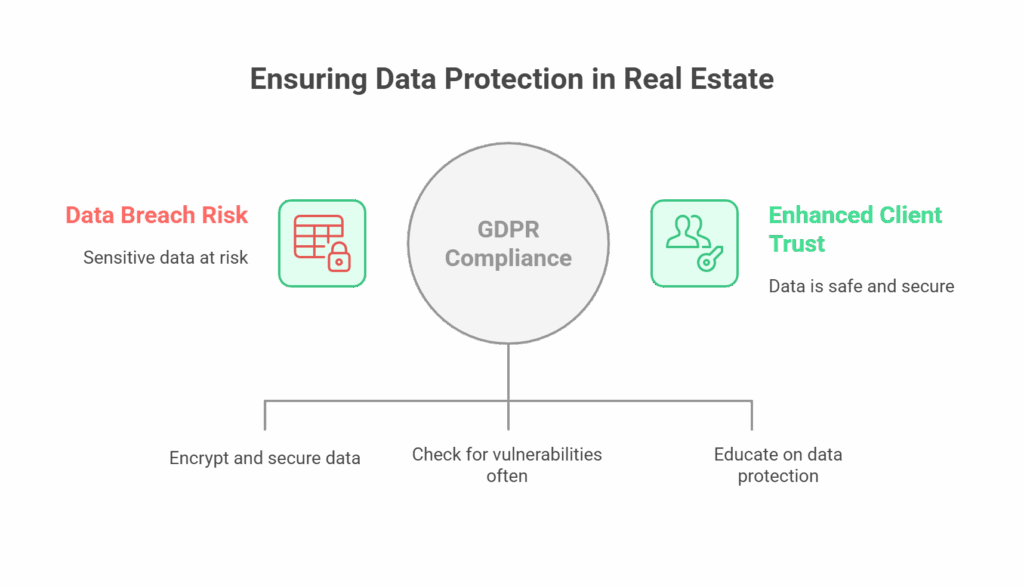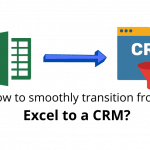When you’re working in real estate, handling personal data is part of your daily routine. This is where GDPR compliance for real estate and CCPA (California Consumer Privacy Act) come into play. Let's break down why these are important.
GDPR is a regulation from the European Union. It was created to give individuals more control over their personal information. It ensures companies handle personal data responsibly. CCPA does something similar, but it's specific to California residents in the United States. Both are about protecting privacy and ensuring data is used fairly.
Why is this significant for real estate? Well, every client's details matter. Brokers collect names, addresses, financial information, and even property preferences. Without proper guidelines, this information could be misused. GDPR compliance for real estate sets clear rules for how personal data should be gathered, stored, and shared.
The push for these regulations grew with rising consumer concerns about privacy. People wanted to know what companies are doing with their information. Thus, giving clients control over their data became a top priority. Regulations like GDPR compliance for real estate empower clients to decide how their information is used. They also help build trust between brokers and clients.
Types of Client Data Collected in Real Estate
In the real estate business, collecting client data is routine. Brokers gather various personal details to provide tailored services—leveraging no-code CRM solutions makes structured data collection painless. But what types of data are we talking about? Let's take a closer look.
Firstly, financial information is crucial. Brokers often need income details, credit scores, and mortgage information. This helps them understand a client’s buying power.
Then, there are basic contact details like names, phone numbers, and email addresses. These are essential for maintaining communication.
Property preferences are also gathered. Clients often share their desired location, type of property, and amenities—consider top CRM features for real estate that let you store and filter these preferences efficiently. This information helps brokers find suitable properties for clients.
Finally, identification numbers, like IDs or social security numbers, may be collected. This is especially true during transactions or when clients make formal offers.
However, brokers must always ensure GDPR compliance for real estate when collecting this sensitive data. Mishandling can lead to legal penalties and loss of trust.
The Importance of Data Protection

Protecting client data is not merely a legal requirement. It’s a fundamental aspect of building trust and maintaining a good reputation in real estate. Let’s explore why this matters so much.
Firstly, real estate brokers handle sensitive information every day. Clients trust brokers with their private data. Proper GDPR compliance for real estate ensures that this trust is maintained. It assures clients that their information is safe from unauthorized access or misuse.
Now, let’s consider what happens when data is not protected. Imagine a scenario where a broker’s database is breached. Sensitive information is leaked—mitigate that risk by using Regulatory and Compliance Software with No-Code. The consequences can be disastrous. Clients may lose their trust in the broker. They may decide to take their business elsewhere. Furthermore, data breaches can attract hefty fines and legal penalties related to GDPR compliance for real estate violations.
Statistics back this up. According to various studies, companies have faced millions in losses due to non-compliance with privacy laws. It shows how crucial it is to stay compliant to avoid financial pitfalls.
Beyond avoiding penalties, protecting data is about professionalism. It reflects a broker’s commitment to ethical practices and client care. By safeguarding client data with gdpr compliance for real estate principles, brokers can enhance their reputation and differentiate themselves in the competitive real estate market.
In summary, data protection through GDPR compliance for real estate is a strategic advantage. It fosters trust, ensures compliance, and safeguards a broker's reputation. Being proactive about data security can make all the difference for real estate professionals.
Basic GDPR and CCPA Compliance Requirements
For real estate brokers, meeting GDPR compliance for real estate and CCPA standards is crucial. These regulations set clear guidelines for handling client data responsibly.Let’s review the key requirements.
- Gaining explicit data consent from clients: Before collecting any personal information, brokers must obtain clear and explicit consent from their clients. This means explaining what data will be used for and ensuring clients understand and agree to it.
- Implementing data minimization and secure storage policies: Collect only the data you need and no more. It's important to minimize the amount of information collected to what is necessary for your services. By also ensuring secure storage of this data, you protect it from unauthorized access and breaches.
- Handling data access requests promptly: Clients have the right to access their personal information. Brokers need to establish processes to handle these requests quickly and efficiently. This includes providing copies of data and making corrections or deletions as requested by clients.
- Ensuring transparency about data use and securing client data rights: Brokers should be upfront about how client data is used. This includes providing privacy policies that are easy to understand. Ensuring that clients know their rights and how to exercise them is also crucial.
Abiding by these compliance requirements not only ensures legal adherence but also fosters trust and professionalism. Real estate brokers who prioritize these practices will find themselves better equipped to protect client data and maintain strong client relationships.
Evolving Privacy Regulations
Data privacy is an ever-changing landscape. Beyond GDPR and CCPA, various other regulations are coming into play globally. These evolving privacy laws aim to enhance data protection across different regions. For real estate brokers, understanding these changes is becoming increasingly important.
For instance, countries like Brazil have introduced the LGPD (Lei Geral de Proteção de Dados) to regulate data protection. Similarly, Canada is modernizing its privacy laws to align with global standards. Even within the United States, other states are following California’s lead by drafting their own privacy regulations.
These evolving laws have significant implications for real estate. As brokers often interact with clients from various locations, they need to adapt to different privacy requirements. Understanding the nuances of each regulation ensures they remain compliant, regardless of where their clients are located.
The potential impact is substantial. Compliance is not just about avoiding penalties. It’s also about maintaining trust and protecting client data effectively. With every new regulation, there’s an opportunity to enhance privacy practices and safeguard sensitive information.
It’s crucial for real estate brokers to stay informed. Keeping track of these evolving regulations can seem daunting. However, it’s necessary to regularly update privacy practices to remain aligned with GDPR compliance for real estate and similar laws.
In conclusion, being proactive about emerging privacy laws can help brokers maintain compliance and uphold client trust. These efforts will contribute to long-term success in the real estate industry.
Leveraging Fuzen's NoCode CRM for Compliance
For real estate brokers, managing client data efficiently and securely is paramount. Fuzen's nocode CRM offers a seamless solution to tackle compliance requirements with ease. Let's delve into how Fuzen can simplify this process.

- Customizing data collection forms: With Fuzen, brokers can tailor data collection forms to meet specific needs—seamlessly link to CRM Calendar Integration for Better Time Management so appointment data flows directly into your database. This flexibility ensures they capture only essential information, aligning with data minimization principles.
- Implementing effective access controls: Fuzen allows brokers to set precise access levels for team members. This strengthens data security by ensuring only authorized personnel can view sensitive information.
- Automating client consent processes: Fuzen streamlines obtaining explicit client consent. Automation helps brokers stay compliant effortlessly, reducing manual tasks and enhancing efficiency.
- Ensuring scalable data storage solutions: As a broker's client base grows, so does the need for scalable storage. Fuzen’s solutions accommodate increasing data securely, ensuring brokers are never left scrambling for storage space.
Fuzen's AI integrations further simplify compliance management. Brokers can customize privacy settings with simple prompts. This brings a high level of personalization to data security. Importantly, brokers can achieve all this without an IT background or bearing excessive costs. Fuzen’s user-friendly interface offers powerful tools for real estate professionals.
In essence, leveraging Fuzen's nocode CRM empowers brokers to manage client data responsibly. It ensures compliance, strengthens security, and supports business growth—all at an affordable price.
Conclusion
In the real estate sector, GDPR compliance for real estate and CCPA compliance are more than legal necessities; they are pillars of trust. By protecting client data, brokers not only fulfill their legal obligations but also fortify their professional integrity. These actions build lasting client relationships, enhancing business reputation. Implementing privacy protocols is often integrated into a CRM framework tailored for real estate professionals, ensuring seamless data management and compliance.
A proactive approach is key. Utilizing tools like Fuzen's nocode CRM simplifies meeting compliance requirements. Its features help effectively manage data protection, making it accessible even for those without technical expertise. Fuzen supports brokers in providing safe, trustworthy services, sustaining client confidence in the process.
Embracing these compliance tools ensures brokers are well-equipped to navigate the evolving landscape of data privacy, securing their position in the competitive real estate market.

Pushkar is a seasoned SaaS entrepreneur. A graduate from IIT Bombay, Pushkar has been building and scaling SaaS / micro SaaS ventures since early 2010s. When he witnesses the struggle of non technical micro SaaS entrepreneurs first hand, he decided to build Fuzen as a nocode solution to help these micro SaaS builders.



